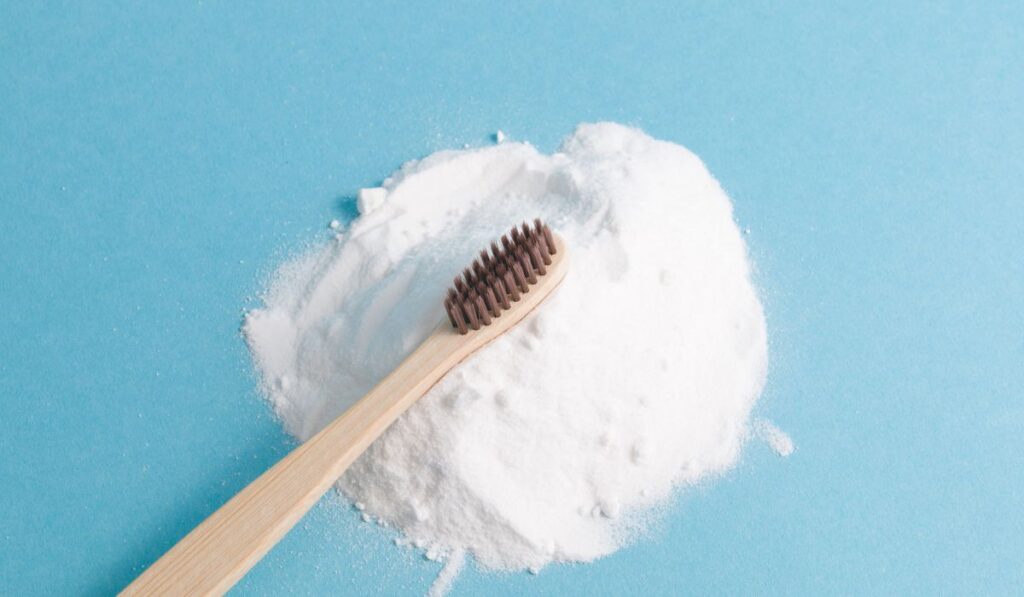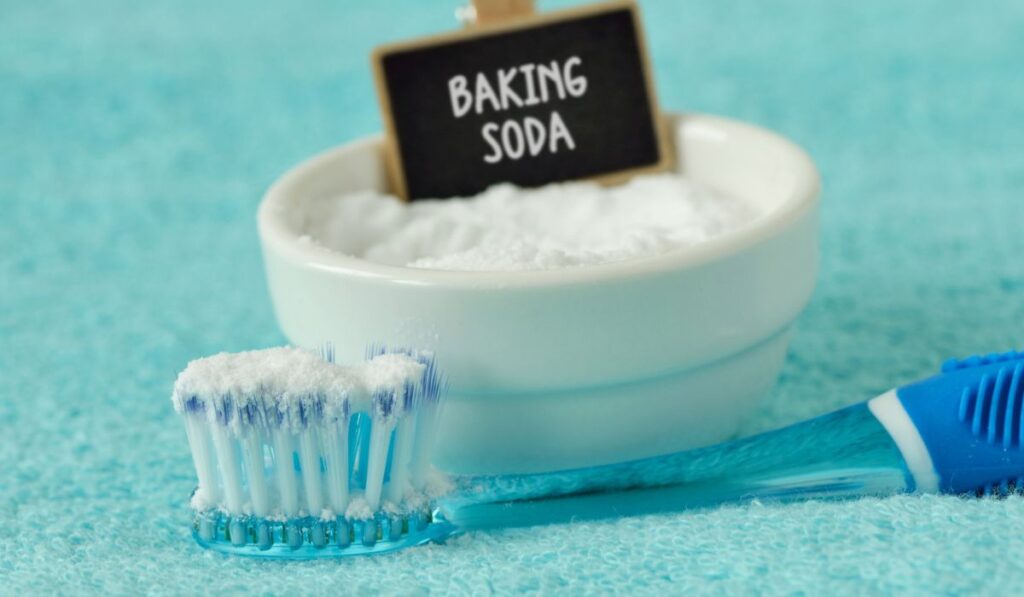Baking soda is a versatile item commonly used in baking and cleaning. But its usefulness extends far beyond those realms — studies and experiments have shown that baking soda is also a great substitute for toothpaste.
Baking Soda is a relatively less abrasive cleaning agent, safe for everyday use instead of toothpaste. Brushing with baking soda can whiten your teeth, help you fight dental diseases, and soothe mouth ulcers. However, it doesn’t protect from cavities as effectively as fluoride does.
Let’s take a closer look at the advantages of using baking soda to brush your teeth, as well as some disadvantages. We’ll also look at how best to use baking soda effectively.
Can I Use Baking Soda to Brush My Teeth?

In a study conducted in 2017, scientists considered the efficacy of bicarbonate of soda (or simply baking soda) as a toothpaste.
Traditional toothpastes have four main components: a binder, an abrasive agent, a surfactant, and a humectant. They work together to remove plaque and debris, whitening the teeth and refreshing the mouth.
The result of the 2017 study suggested that baking soda effectively removes plaque and debris, and its alkaline pH value prevents tooth decay by neutralizing mouth acidity.
Safe Way to Remove Plaque
One of the primary functions of toothpaste is removing plaque and stains. To accomplish that, every toothpaste needs some degree of abrasiveness.
However, an excessive degree of abrasiveness can be detrimental to the teeth. Common abrasive agents used in toothpaste are Silica, Aluminium Oxide, and Calcium Pyrophosphate.
The Relative Dentin Abrasity (RDA) is a scale measuring toothpaste abrasity. Toothpastes ranking 69 or below are within the safe range and those ranking above 250 are too abrasive.
So, what happens when a particular toothpaste is too abrasive? In simple terms, abrasive toothpastes can break down the enamel of your teeth and cause teeth erosion. Following enamel breakdown, erosion will quickly start, and, in the process, the teeth will appear yellowish in color and may be covered in cracks.
Baking Soda only has a ranking of 7 on the RDA Scale, making it a safe option for removing plaque.
How to Use Baking Soda to Clean Your Teeth
The best way to whiten your teeth is by scheduling a visit with your dentist, but you can also achieve decent results with baking soda. Follow these instructions:
- Mix baking soda with water in a glass a bowl until it turns into a paste.
- Dip your brush into the paste and get as much as you can on your brush.
- Gently brush your teeth in circular motions, ensuring you cover all your teeth.
- Keep the motion going for at least one minute, then rinse with a bit of water until all the grit is removed.
To enhance the effectiveness of baking soda, you can use it in combination with other ingredients known to improve oral health. Some common ingredients that work well with baking soda are lemon and hydrogen peroxide (on Amazon).
Pros of Using Baking Soda to Brush Your Teeth
Using baking soda as a toothpaste substitute isn’t a practice that’s used only for of its teeth-whitening potential. Baking soda offers a wealth of benefits:
Teeth Whitening
Many people know about baking soda’s teeth-whitening properties, but very few actually understand the science behind it. The short of it is that baking soda is an abrasive agent.
Abrasive agents remove stains and whiten teeth in the process by scratching away at the teeth’s surface to remove stains. But unlike most abrasive agents used in commercial toothpastes, baking soda is gentler on the teeth.
Fights Dental Diseases
Bacteria is responsible for dental diseases like gingivitis. When you rinse your mouth with a baking soda solution, it increases the pH in your mouth, and the environment becomes less acidic.
This makes it more difficult for disease-causing bacteria to spread, helping prevent oral diseases.
Soothes Mouth Ulcers
One of the likely causes of mouth ulcers is also a high acidity level in the mouth. As we just mentioned, baking soda helps balance the pH level in the mouth, which reduces inflammation, irritation, and sores.
Applying a paste of Baking soda to mouth ulcers, letting it dry, and then rinsing it off will prove quite effective at getting rid of the sores.
Cons of Using Baking Soda
While baking soda can work wonders on your overall dental health, it’s not free of drawbacks — and it’s certainly not for everyone. Here are common cons of substituting your usual toothpaste with baking soda:
May Not Fully Whiten Teeth
According to the RDA, Baking soda has an abrasive value of 7. This is wonderful news to some since it provides confirmation that baking soda isn’t too abrasive, but, at the same time, it may also not be a strong enough abrasive for some people.
With such a low level of abrasiveness, baking soda may not fully whiten your teeth, depending on the natural composition of your teeth.
It Doesn’t Contain Fluoride
Fluoride is a crucial element found in most toothpaste that protects the teeth and prevents tooth decay.
Fluoride is a naturally occurring substance found in air, water, and in our bodies, but the fluoride in toothpaste provides a much-needed extra dose to help us fight cavities.
So, without the fluoride in toothpaste, your teeth may not have sufficient protection from cavities.
Frequently Asked Questions

How Long Does It Take to Whiten Teeth With Baking Soda?
When using baking soda as a toothpaste substitute, many people get discouraged because they don’t observe a dramatic change in the color of their teeth.
So, perhaps the most frequently asked question about baking soda is how long it takes for it to whiten teeth. Realistically speaking, you should begin to see results within two to three weeks.
However, as previously mentioned, baking soda is a relatively weak abrasive agent. So, while it does work, it doesn’t work as fast as other abrasive agents out there.
Another factor to consider is the natural color of your teeth. It’s important to note that baking soda will only whiten your teeth back toward their original color.
Since baking soda doesn’t contain any bleaching elements, you probably won’t experience a very dramatic change in color. If that’s what you’re seeking, you may need to seek other treatment options.
How Often Can You Use Baking Soda to Brush Your Teeth?
According to the American Dental Association (ADA), baking soda is completely safe for everyday usage, even twice a day in some cases. However, you still need to proceed with caution because baking soda comes with some risks.
For instance, baking soda may not be excessively abrasive to your teeth, but the gums and other surrounding tissue are more susceptible to its damaging effect. It’s therefore recommended that you use baking soda daily until you’ve achieved your desired results, and from there onwards, cap the usage to 3 times a week.
Although you can safely use baking soda twice a day, mixing things up with some fluoride toothpaste (on Amazon) here and there will allow for fresher breath and an additional layer of fluoride protection.
What Else Works to Whiten Teeth?
The biggest contributing factor to yellowing teeth is plaque accumulation since plaque sits on your teeth and gives them a yellowish tint.
However, repeated visits to the dentist to get your teeth professionally whitened can break the bank. Luckily, several DYI remedies can brighten your smile.
A natural remedy that many people swear by is hydrogen peroxide. It’s a natural bleaching agent that also kills bacteria.
Aside from hydrogen peroxide, coconut oil (on Amazon) is another effective remedy. A natural method known as oil pulling removes plaque by swishing oil in the mouth.
Coconut oil is a preferred oil choice in this case thanks to its health benefits and pleasant taste.
The Final Word
If you had any doubts about using baking soda as a toothpaste, you can put your doubts to rest. Baking soda is abrasive enough to remove debris and plaque, but not too abrasive to destroy your teeth’s enamel.
Dabbing your toothbrush in a baking soda paste and then using it to brush your teeth in circular motions goes a long way in fighting bacteria and plaque.


